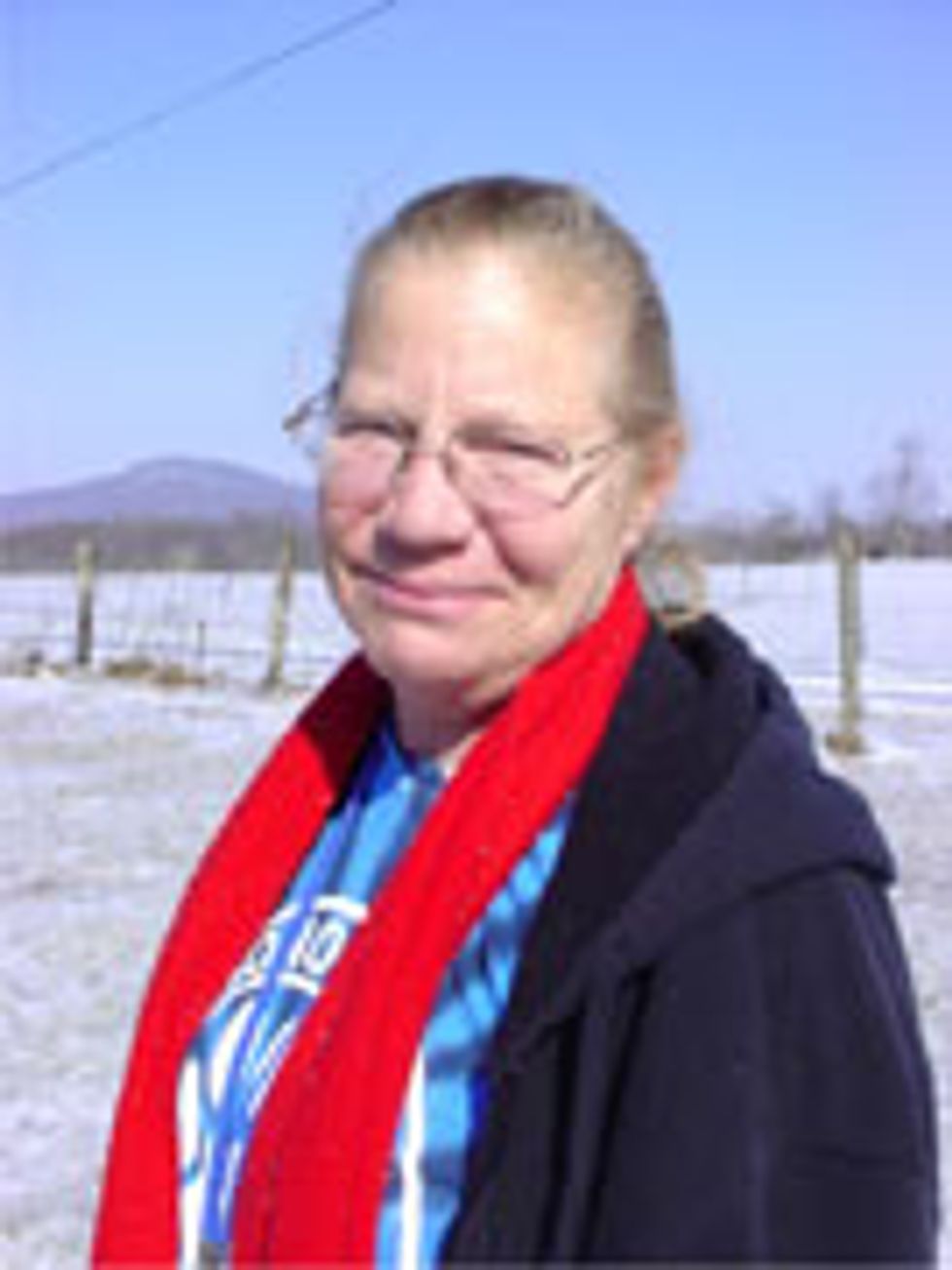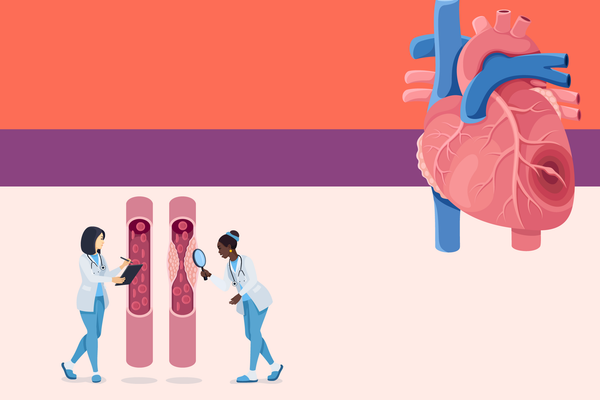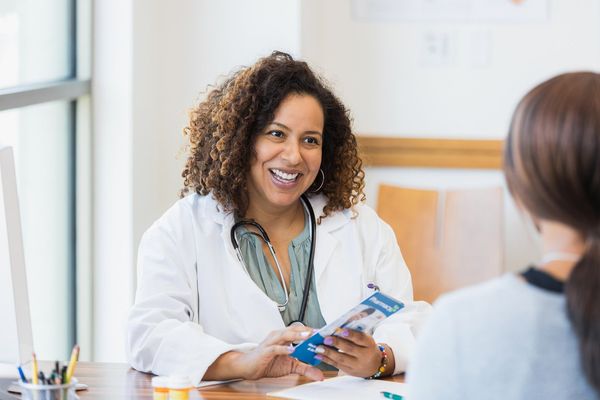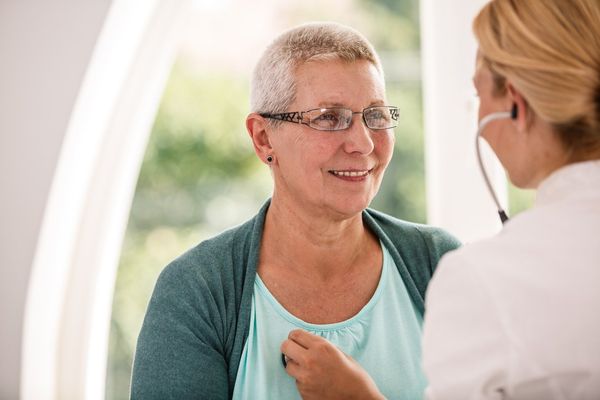
I just turned 50 and, to tell you the truth, I'm kind of surprised I made it. Celebrating this milestone was the last thing on my mind in June 2003 when I had my first heart attack and then my second, within five days of each another.
Indigestion had been bothering me off and on for a few weeks before my heart attacks. I treated it with indigestion medicine my doctor prescribed and, for the most part, the discomfort went away—until the Father's Day dinner at my sister-in law's house. I only made it halfway through dinner before I felt so bad I had to go lie down. I took something for what I thought was indigestion and the pain mostly went away.
Later that night, I woke up in pain again, took more medicine and something for the pain, but never really got back to sleep. At 2 a.m., I woke up my husband and asked him to take me to the emergency room, which was about 30 minutes away. When we arrived, they took me right away to a trauma bed. The doctor told me later that I was completely gray when I walked in the door—and, from her emergency medicine experience, she recognized a heart attack when she saw one.
My blood work confirmed the ER doctor's hunch: it had been a heart attack—which, according to the tests results, probably had happened at dinner earlier that day. When they told us, my husband was the one who went white. I told them that he needed something, not me, and they took him out of my room to talk with him. After they stabilized me, I was flown to a larger hospital's cardiac care unit for angioplasty, where they opened up a blockage in an artery behind my heart. I came home two days later.
I'm the classic case of not having normal heart attack symptoms—like so many women who have heart attacks. I even had a good primary care physician—and he missed my symptoms. I live and work on a 48-acre farm, so I get plenty of daily exercise from early February to after Halloween planting and harvesting wildflowers and vegetables for local farmers' markets. I eat healthy food—farm-raised food. There isn't even any history of heart disease in my immediate family—in my parents, my three athletic brothers, my sister, or my huge extended family of 10 aunts and uncles and 20 cousins. I don't drink alcohol but I used to smoke—about a pack a day—before the heart attacks. Heart disease was the furthest thing from my mind.
But it's clear now that my symptoms were a heart attack waiting to happen. And, it's also clear to me that I had spent a lot of time taking care of just about everyone except myself. I came home from my heart procedure on Thursday, and on Sunday morning I was back in the kitchen cutting strawberries. My little girl, Sarah, was three years old then. She was asleep on the couch. My husband and father-in-law were in the fields working—I could see them out the window when the crushing pain in my chest began again. I took the nitroglycerin my heart doctor had prescribed, and it had no effect. I yelled to my father-in-law and he heard me—some sort of miracle, because he's deaf in one ear—and grabbed the phone and called 911.
In sheer terror, I took my first trip in an ambulance. As we made our way down the driveway and back down the road, I tried to convince the paramedics not to turn the siren up because I didn't want Sarah to wake up. I was so worried about my husband bringing up Sarah by himself. It was all I could think about.
This time, a blood clot had come loose and caused another blockage. It's not that unusual after angioplasty. But, the blockage was much worse the second time around, and it was in a different location. I had another angioplasty procedure and stayed in the hospital for five days. I was so scared by this time, I hardly moved at all. I can still see the concern on my strong brothers' faces as they sat at the foot of my hospital bed most of my entire stay.
Did my life change? Everything changed. I went through heart rehabilitation and learned all about heart health from the heart team. I bought all the cookbooks I could on heart-healthy food and walked and walked. I probably went overboard. Since then, things have calmed down a bit, and now I've even let ice cream back into the house.
After my heart attacks, joining a heart-health group in my small town was helpful—everyone was very nice—but I didn't really fit in. I was the youngest woman by a good 20 years, and the support sort of ran its course. My family helped out a lot, especially with Sarah, but I was never sure whether I should get up and go running or be still on the couch.
At some point, everything just froze and stopped. Something told me I needed therapy—more support—so I called a therapist. No one I know has ever tried therapy before. But, I felt so alone. Sarah was in preschool and my friend's children were all grown. Here I was in a rural area with a four-year-old and heart disease. I know now that depression following a heart attack is common, and I continue to be treated for it.
Almost exactly three years after my heart attacks in May 2005, a mammogram revealed something suspicious in my breast. Sarah was in kindergarten. Additional tests confirmed breast cancer. I had a lumpectomy to remove the tumor, and then I had radiation and chemotherapy. All through my breast cancer treatment, my nurses paid close attention to my heart health. My history of heart attacks made my treatment more complicated because chemotherapy can affect your heart.
Now, I speak locally off and on to different groups—primarily to teens about not smoking. I hope that maybe just one word I share might make them think about their own health and help them speak up about it. Every day, I join Sarah, now a fourth-grader, as a volunteer playground and cafeteria supervisor for a few hours. It gets me out of the house, and it's nice to be part of her life at school.
I also volunteer with a local affiliate for Relay For Life. I know so many women around my town who have had heart attacks or who have had breast cancer. Many don't share their health issues. It's their decision, I guess. But, you don't get the support if you don't share. For me, it's another day to tell my story, and I feel so much better about telling it than hiding it.




